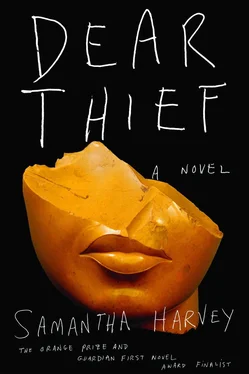Sometimes you took payment in kind: jewellery, clothes, shoes, drugs. You would come back to Morda with your hair pinned in place with a Mexican silver barrette, or in an elegant, outdated silk shift and trousers, or with a sachet of pinkish amphetamine that you would tap tentatively into a soda water after dinner with a kind of generous sense of experiment; you were just trying out a gift, after all. It would be ungrateful not to. I might find a bottle of Chanel No. 5 on my bed, or a book — yes, you passed on to Nicolas and me an unwanted illustrated book of South African diamond mines. You accepted the strangest forms of payment, if you don’t mind me saying, and they became ever stranger as time wore on. The return leg of a two-way ticket to Johannesburg, should you ever want a holiday you couldn’t come back from. Shoes that you would never wear, a handmade patchwork bedspread someone’s grandmother had toiled over; and of course the little sachets, the pinkish yellowish greyish or bright white powders, the tiny pricey offerings of amphetamine or cocaine or heroin; they amassed over time and you hid them in a locked box at the back of your wardrobe so that Teddy could never find them.
This is what I was thinking when Yannis spoke — about your London life I never really saw, but which ate at you in mouthfuls. I saw you, in my mind as I was thinking, as a firework opening up and fading out. At first it was hair clips and dresses and stockings and clasps, so that you came home dazzling ironically, smiling, laughing, smearing orange grease on your eyelids. Nicolas hinted that he thought you had several men waiting for you there, several lovers, although he did not use that word. You handed over money each month for your keep. And then, over the three years, you would come back ever more jaded and falsely brisk, your wages seldom in the form of cash, more often in the form of folded sachets squirrelled away into the lockable box, your mood held up increasingly by a synthetic hum of restless energy that had a disappointing lifespan which, when it wore out, left you for days in your room.
Ah, but none of this is the heart of the matter, is it? Surely the heart of the matter is a guest-house in Earls Court where Nicolas stayed when he was working in London. The Ellis Guest-house, run by Mrs Ellis, stand-in mother to Nicolas, poacher of perfect eggs, server of hot buttery toast (a toast-rack denier, a loose-tea evangelist), who judged not, who ran her house with discretion and honoured her guests with privacy and tried to pay attention to the small things — plenty of toilet roll in the bathroom, clean, sharp cutlery, extra blankets for winter.
All sorts of people went through Mrs Ellis’ house and her door was always open, so long as you could pay the minimal prices. The regularly homeless, the recently divorced, the runaways, illegal immigrants, failing writers, out-of-work actors, those fresh from jail. Nicolas liked her liberalness and her quiet revolt. She would have been exactly the kind of person to turn a blind eye to the woman who sometimes went up to his room and left his pillows smelling of cypress and smoke, and exactly the kind of person to supply scissors when he asked, without a pause or a question, and to not comment the next morning when, alone at breakfast, he looked stricken, a lock of dark hair wrapped around his hand. That woman’s dark hair, unmistakably; there it was, the same smell, piercing through swirls of warm milk and breakfast butteriness.
I almost asked Yannis, there and then, to come with me to Earls Court and see if the guest-house was still there. It was late, and the errand pointless, so I didn’t ask after all. At home, after I’d left Yannis bemoaning the loss of morals, bemoaning you and Lawrence, slipping The Rainbow under the Racing Post , I did the things one does for bed — clothes off, teeth cleaned, face washed — and then I took that lock of hair out of the desk drawer, where it lives between newspaper in a shallow cardboard box that once housed a portable radio, and I placed it on the desk and stepped away from it. Years since I’ve looked at it. The fascination is still with the same particular thing — not the foot-and-a-half of hair itself, not the buffed-leather cavalry-boot black with its mahogany surprises, not the unkempt ends, not the cypress, the smoke, the coffee, the trapped life in the dead strands — but the top of the hair where the scissors made a clean swipe. A straight line, a decision; this is how I see it, a decision . Whose decision? Whose hands held the scissors and sliced that clinical line in the lamplight or dark? Yours or his?
Just this last week at work I was told a story that I’d like to recount for you. It was Gene who told me. The two of us sat outside in the wind and sun, and he told me that when he was in his early thirties he became involved with a married woman. He wasn’t married himself. When he came home from war aged twenty-eight after three years’ service he didn’t feel he had enough humanity left to marry. Many felt that way, he said, even the ones who were married already. An affair seemed the most and best he could manage — this in a world in which casual relationships between men and women were not the norm, but also in a world in which war had forced years of celibacy on young men.
A year after the war he met a woman whom he called, mysteriously, M. I will always be left to wonder — Maria? Martha? Madeline? When he told me how he felt the first time he saw her, he started to embark on a theory of attraction. It is Plato’s theory of the missing half — a famous story, but I will summarise it anyway. Once upon a time a single human being was both genders, with eight legs, eight arms, two heads, two sets of genitals, each human both male and female and also a third gender, androgynous, and each parented by the sun, the Earth and the combination of these, the moon. Fearing their power, Zeus cut them in half so that they became distinct, one man, one woman. The combination of both, the third gender, disappeared. He cut them — here Gene quotes Plato— as you would cut hard-boiled eggs with hairs . Ever since this separation, men and women have longed for one another, and the longing has been a desperate one for completion and for the healing of the wound of separation.
I think Gene referred to this theory because other more earthly explanations completely escaped him when he thought of his attraction to M. He ran out of words when he stopped referring to Plato and he just stared ahead for perhaps as long as a minute. When he started again it was to take up the facts: they met, they went out for dinner and a drink, they met again, they slept together, they slept together again. Though she was married she was childless; nevertheless, she said she couldn’t, wouldn’t and didn’t want to leave her husband, and he told her he understood. He told himself it would have been disastrous if she had wanted to, since he had nothing left in him to give a woman except his lust, which, despite its tyrannising power, he would always try to be gentle enough in giving. You don’t want to become one of those brutes, he said, and I nodded, though I can only imagine what brutality it was he had seen and was refusing.
She was a good woman, he said, and he seemed to want to bring this point to the fore. Good as in kind, gentle, compassionate, decent. When he told me this I think he was challenging me to disagree, but I nodded. I expect she was all of those things. And it went on for a few months, he said, seeing one another once in a while, and it seemed a convenient arrangement. For him it was something physical, and although their opportunities were scarce, even in the weeks of no or little contact it was enough that he still had in her a place for his desire to go, somewhere for the thoughts to land. For her it was the intake of fresh air in a life that had become otherwise still and — stale. Then he recanted: No, not stale, that’s my word, M never used words like that. If she referred to her marriage at all it was briefly, with tenderness and without judgement. The only impression he ever got of that marriage was that it was still. Not stale, not bitter, not going to pieces, just not going at all.
Читать дальше












